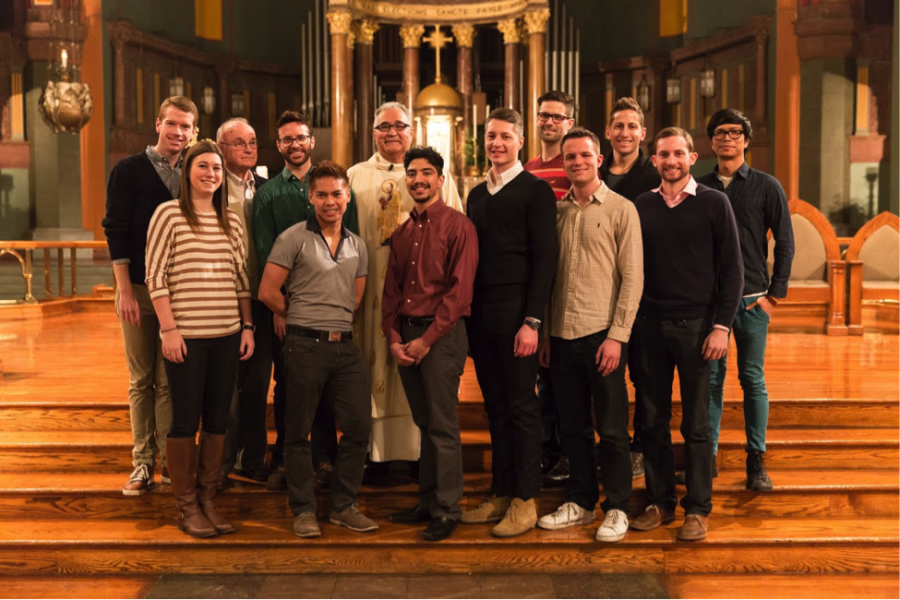Alumnus creates documentary exploring boundaries of sexuality and religion
April 23, 2015
 Villanova alum Michael Tomae had a vision. He saw the need to ignite a discussion about the challenges LGBT Catholics endure as a part of their daily lives. With determination and help from his parish, he set out to fill that need through film.
Villanova alum Michael Tomae had a vision. He saw the need to ignite a discussion about the challenges LGBT Catholics endure as a part of their daily lives. With determination and help from his parish, he set out to fill that need through film.
Tomae produced and directed a documentary titled “OwningOurFaith,” which premiered for free online on March 10 and has since been viewed more than 26,000 times, in three different languages, around the world. The 15-minute film has also been hand-delivered to Pope Francis and seen by numerous administrators and faculty in the Villanova community.
Tomae, a 2012 graduate who studied Finance and Accounting, got the idea for the short documentary while working with the Covenant House, a homeless shelter for young adults. He recognized that many of these teens had been rejected by their Christian families because of their sexuality or gender identity.
So, Tomae decided to act. He reached out to the community at his church in Manhattan, St. Paul the Apostle, and formed a team to launch a campaign focused on sharing stories of LGBT Catholics. The team invited 20 individuals from across the United States, including the Chaplain of the U.S. House of Representatives, Father Patrick J. Conroy, to share their stories about being or having close relationships with LGBT Catholics.
The film touches on three main themes: sexuality and faith, LGBT people as gifts to the Catholic Church, and the idea that all are welcome and loved by God. The interviewees range significantly in age, race, and gender, but all believe in the fundamental idea that the Catholic Church can and should embrace LGBT individuals as a part of the rich diversity that makes up the faith.
Several individuals in the documentary focused on how welcoming, or often unwelcoming, the church can be towards LGBT individuals. “I always feel a little bit cautious,” said Andy Lawton, an openly gay physician from Portland, Ore.
Matt Putorti, an openly gay lawyer from New York, also commented on the issue and said though the church sometimes claims acceptance, they also advocate for the celibacy of homosexual individuals. “What the church is saying is that you cannot live fully,” Putorti said. “You can be gay, but you cannot live that life. That inherently is discriminating.”
Another topic addressed by the interviewees is the notion that LGBT individuals are lesser than, or not as worthy of God’s love. Mike Roper, a 74-year old openly gay teacher, had a simple rebuttal: “God doesn’t make junk.”
Roper went on to explain that all human beings are members of God’s creation, and “to deny that is to deny that He knows what the hell he’s doing.”
Finally, the documentary answered why all of these individuals had remained in the Catholic faith even though they, or their loved ones, were often marginalized by the church’s teachings. Matt Vidal, a married gay lawyer in New York, said, “If we abandon the Church then it’s never going to change.” Others reflected similar sentiments, and Nana Fotsch, a grandmother to several gay grandchildren, said the church needs to constantly ask itself if all people were really welcome in this place.
“Do we really mean that?” Fotsch said. “Or is it just pretty words.”
The documentary is timely in that the Ordinary Synod of Bishops will discuss family in contemporary life in the Catholic Church next October. The World Meeting of Families is also set to take place in September in Philadelphia.
Tomae said, in an interview with Busted Halo, that, “Pope Francis and the church have an incredible opportunity and responsibility to reach out to the millions of LGBT people around world and say, ‘I love you and you are perfect the way you are.’” He hopes “OwningOurFaith” will aid the church in this mission.
In addition to the international acclaim the film has received, the response at Villanova has been extremely positive. Dr. John Edwards, a theology and religious studies professor, said that the film was a moving portrayal of the issues facing LGBT Catholics today.
“Villanova should be extremely proud of this alum,” Edwards said, “for the courage, determination and love that has led him to take action toward lifting up the voices of people that the church has been more inclined to talk about than listen to.”
Dr. Nancy C. Sharts-Hopko, a professor and director of the Nursing school, agreed with Edwards and said LGBT individuals should not only be tolerated, but encouraged to participate in the Catholic tradition: “People’s yearning for full participation in a sacramental life should inspire us! As Francis has said, who are we to judge?”
The student response has also been overwhelmingly supportive. Even students like Aisha Chughtai, who does not personally identify as Catholic, see the relevance of the message in the film. “I found the documentary to be more so about the importance of accepting individuals for who they are, regardless of the labels that define them,” Chughtai said.
The question remains of what more Villanova can do. How should Villanova respond and reflect the sentiment of “OwningOurFaith”? Edwards hopes that the University will “follow Michael’s example in creating opportunities for this kind of dialogue to happen on our own campus.” Sharts-Hopko and Chughtai agree, and Chughtai said that it is “vital for Villanova to take the message from the documentary and learn to apply it.”


